Stay ahead of the curve as a political insider with deep policy analysis, daily briefings and policy-shaping tools.
Request a DemoCan legislation to reduce risks posed by dangerous sexual offenders succeed this time?

Update, March 9, 2023: HB 188, the Dangerous Sexual Predator Prevention Act, sponsored by Rep. Steve Sainz, R-St. Marys, passed unanimously in the House. It now heads to the Senate. The bill requires life sentences in prison or on probation, and electronic ankle monitoring for repeat sex offenders. HB 463, which would reorganize the operations of the Sexual Offenders Registration Review Board, did not move forward.
ATLANTA — Two state legislators are planning to introduce bills that would affect how people convicted of sexual offenses in Georgia are sentenced and monitored.
One bill focuses on the highest-risk class of “sexually dangerous predators” who are repeat offenders, and the other attempts to address the staggering backlog of cases at the Sexual Offender Registration Review Board (SORRB), which rates the risks that sexual offenders pose to the public.
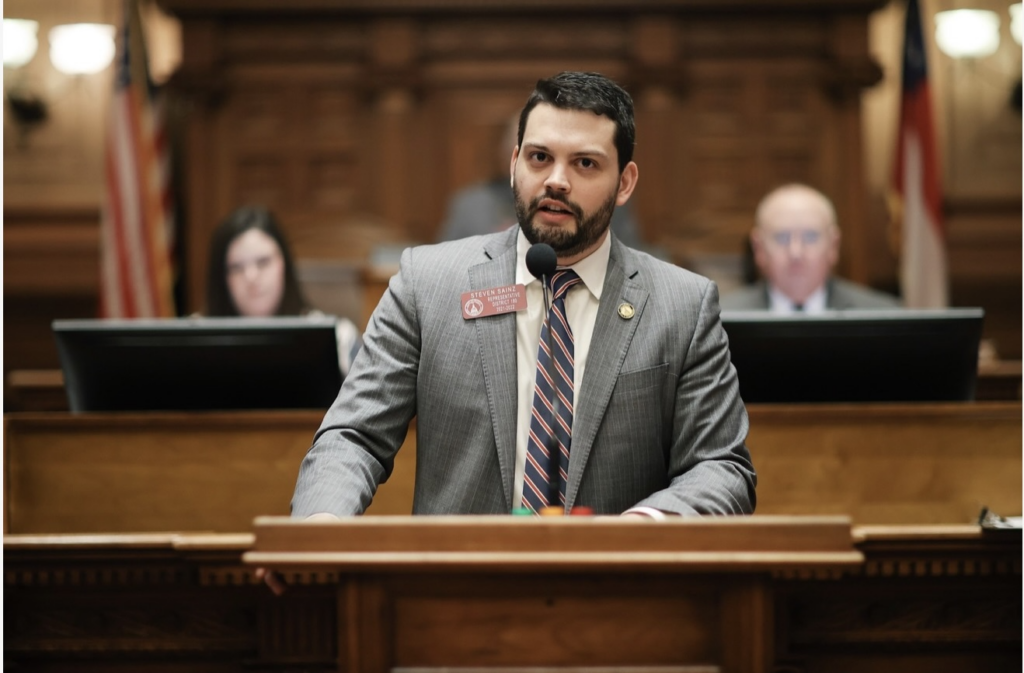
Rep. Steven Sainz, R-St. Mary’s, will be introducing, for the fourth time, the “Georgia Dangerous Sexual Predator Prevention Act,” intended to make life sentences — consisting of prison time, probation, or a combination — mandatory for people who are convicted a second time of one of 13 felony sex crimes. Those repeat offenders would be required to wear a GPS ankle monitor after they are released from prison.
Meanwhile, Rep. Mandi Ballinger, R-Canton, is crafting a bill that will change how SORRB operates in an effort to help the review board evaluate the risk level of more than 6,000 sexual offenders who have been convicted but not yet classified by the agency. Some of those people are incarcerated, and some are living in communities around the state while serving parole or probation.
The legislation is arising at a time when many people are concerned that the state is failing to adequately address the potential risks posed by dangerous sex offenders.
The recent kidnapping, attempted rape and murder of a young woman in Atlanta by a convicted sex offender exemplifies the need for legislative action, says Rep. James Burchett, R-Waycross, who is the majority whip and a member of the House Judiciary Non-Civil Committee.
Mariam Abdulrab, 27, finished her night shift at a bar in midtown Atlanta in August 2021 and was reportedly followed home by DeMarcus Brinkley, 27, who had been released on probation 10 months earlier after serving seven years in prison for child molestation. Brinkley allegedly accosted Abdulrab at gunpoint in front of her house in south Atlanta and forced her into his car, according to Abdulrab’s boyfriend, who said he witnessed the abduction through a window. Within an hour, Brinkley allegedly attempted to rape, then shot and killed Abdulrab, leaving her body about a mile away from her home.
At the time, Brinkley had not yet been classified by SORRB. He had previously been convicted of one count of child molestation involving a 6-year-old girl.
“So we have a murder by a sexual offender that was not classified,” said Burchett. “If he was being monitored, he would have been less likely to commit this crime.”
Sainz said his bill would make it so that repeat sexual offenders are automatically monitored if and when they’re released from prison, in part by mandating long, and in most cases, lifetime probationary sentences. In 2019, the Georgia Supreme Court ruled in favor of a convicted child molester who argued the unconstitutionality of requiring sex offenders to wear ankle monitors once they’ve completed prison, probation or parole sentences.
Since that court decision, 735 of the 1,354 people classified as sexually dangerous predators in Georgia, who formerly had been required by SORRB to wear ankle monitors for life, have had the devices removed. Now most of them are tracked primarily by annual visits from county sheriffs, who are stretched to check up on all 32,000 people listed in the Georgia Sex Offender Registry.
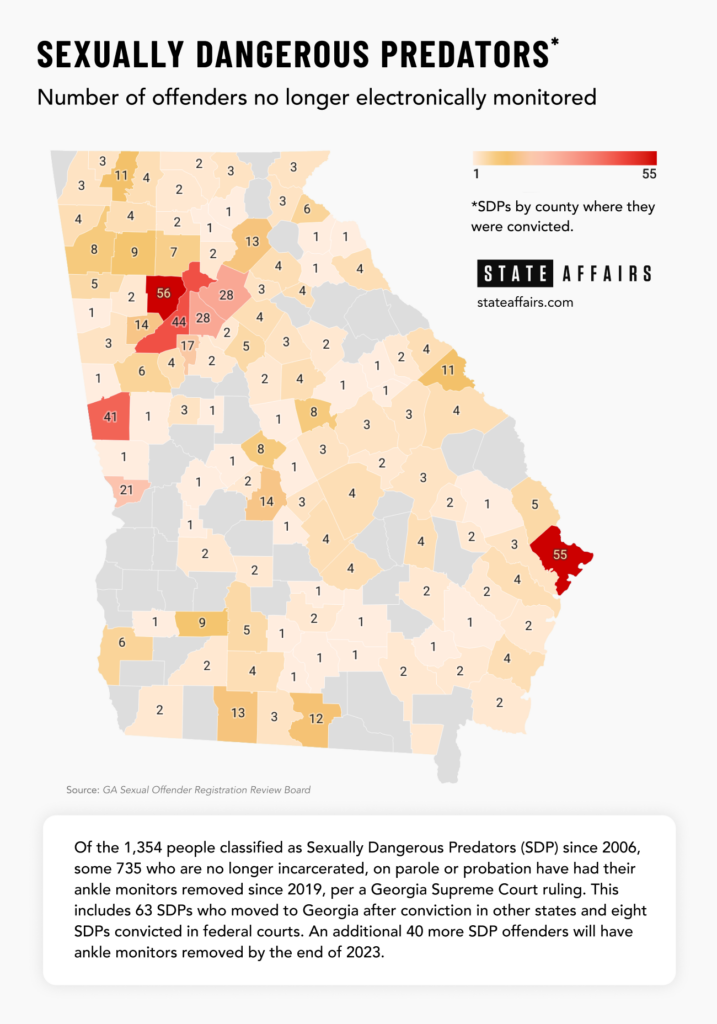
“These higher-risk people need to be tracked when they’re out of prison,” said Sainz. “And GPS monitoring has been shown to be an effective deterrent against sexual predators.”
Sainz has expressed frustration that while the House has approved his bill three times, it has not moved in the Senate. In an effort to ensure that the bill passes this time, he told State Affairs he is considering making some changes to the bill that “would give judges more discretion when sentencing” repeat sex offenders.
Last year the bill (HB 194), which passed 110 to 59 in the House, didn’t make it out of the Senate Judiciary Committee, chaired by Sen. Brian Strickland, R-McDonough. Strickland said the bill stalled “because there was concern on the mandatory minimums.”
At that committee hearing, Jill Travis, executive director of the Georgia Association of Criminal Defense Lawyers, complained that the bill mandates life in prison for a person’s second sexual offense, “no matter what the circumstances. … Life in prison means 30 years before you’re eligible for parole.”
Travis gave examples of some offenders who might receive life sentences for sexual offenses committed when they were young.
“How about improper sexual contact?” she said. “The 22-year-old substitute teacher is romantically involved with a 17-year-old student who is not actually his student. That’s a life sentence.” Travis acknowledged that the teacher would have had to have been “[previously] convicted of one of these felonies.” Travis argued for giving judges more flexibility in sentencing and around requirements for ankle monitors, asking the committee to change the sentences for several sexual offenses listed in the bill from “shall” to “may” require lifetime electronic monitoring.
Sainz complied, making that change in a last-ditch effort to pass the bill in a substitute version attached to a Senate bill related to child molestation (SB 382) in the waning days of last year’s session. The House once again passed it, but the clock ran out before the Senate could consider the amended bill. Sainz remains conflicted about altering his preferred “two strikes you’re out” approach.
“To be frank, Ms. Travis tries to find the perfect case that in theory, this could affect, and we’re trying to look at a data-based, measured approach,” said Sainz. “What she doesn’t mention are the heinous individuals that this bill would make sure that we monitor appropriately. It’s not hyperbole to say there will be more victims of sexual crimes that could have been prevented if our state had acted in a timely fashion.”
Nevertheless, Sainz said he is open to compromise this time around. “I don’t want to delay that action by insisting on the perfect bill if we can get something passed that’s acceptable to a judge and makes sure the state retains the right to GPS monitor.”
“This is difficult,” Strickland said. “It seems reasonable to make sure we’re keeping an eye on people who have a history of committing sexual offenses and taking advantage of vulnerable people. That said, if there’s a way to balance that with our desire to have a judge who sees the whole case, sees the defendant and hears all the facts, and a district attorney who may want to go in a different direction, having some judicial discretion would be a positive thing.”
The people who live in the Lakewood neighborhood in south Atlanta where Mariam Abdulrab’s body was found aren’t as measured in their view of what the punishment for sex offenders should be.
“That kind of crime, it’s the worst thing that can happen to a person,” said Robert Richardson, 72, who works as a dishwasher at the Something Special diner in Lakewood. “You hurt a person that much, that’s too bad for you. You need to be locked up for a long time, then you need to be watched like a hawk.”
“It sounds about right to me that we should keep close track of sex offenders,” said Valeria Calhoun, 64. Interviewed at the Family Dollar store on Lakewood Avenue where she works as a cashier, Calhoun said she knows the Brinkley family well, as her niece has been a lifelong friend of Demarcus Brinkley’s sister.
“He grew up in a troubled household, and I have sympathy for what his family’s going through,” she said. “But society needs to be protected. I have a bunch of nieces and girls in my family, including two granddaughters. I really don’t think people like that change. He had just gotten out of jail for doing basically the same thing.”
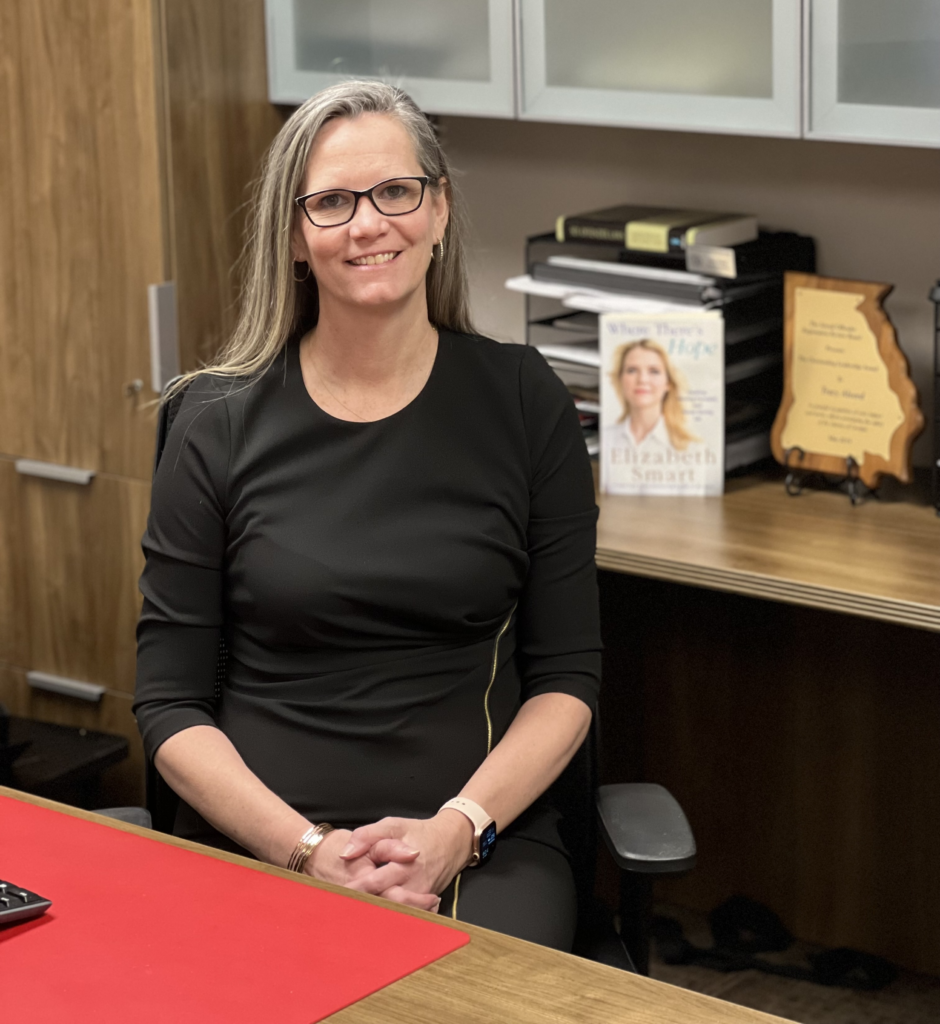
Tracy Alvord, who has served as executive director of SORRB since 2010, said, “Recidivism tells us a lot about a person and their drive to commit their offending behavior. When someone has been caught and yet goes on to do it again, and has a deviant sexual interest, they’re clearly at a higher risk. It’s not just someone who had this funky time in their life and they’ve stopped the behavior. They’re continuing, and they need to be monitored.”
Alvord said she would support Sainz’s bill, with or without new language giving judges more discretion in sentencing.
“As long as the focus remains on appropriate protection of the public and allows SORRB to present the judge with good, comprehensive information about the offender — because just like anybody, judges want to get it right,” she said. “Giving them some leeway to decide that a person not do their entire life in prison, and potentially do probation versus prison, depending on the case, but still being on the [ankle] monitor until and unless they are reclassified at a lower risk level, that’s all very appropriate.”
Alvord added that she’s equally invested in another bill to be proposed this session by Ballinger, which would restructure how SORRB operates. Ballinger currently serves on the SORRB board.
Due to the tremendous backlog of cases and the time that it takes her staff and board to work through them, Alvord said “the more cases we get, the more we get behind. And the concern is those higher risk sex offenders not getting the attention they need soon enough.”
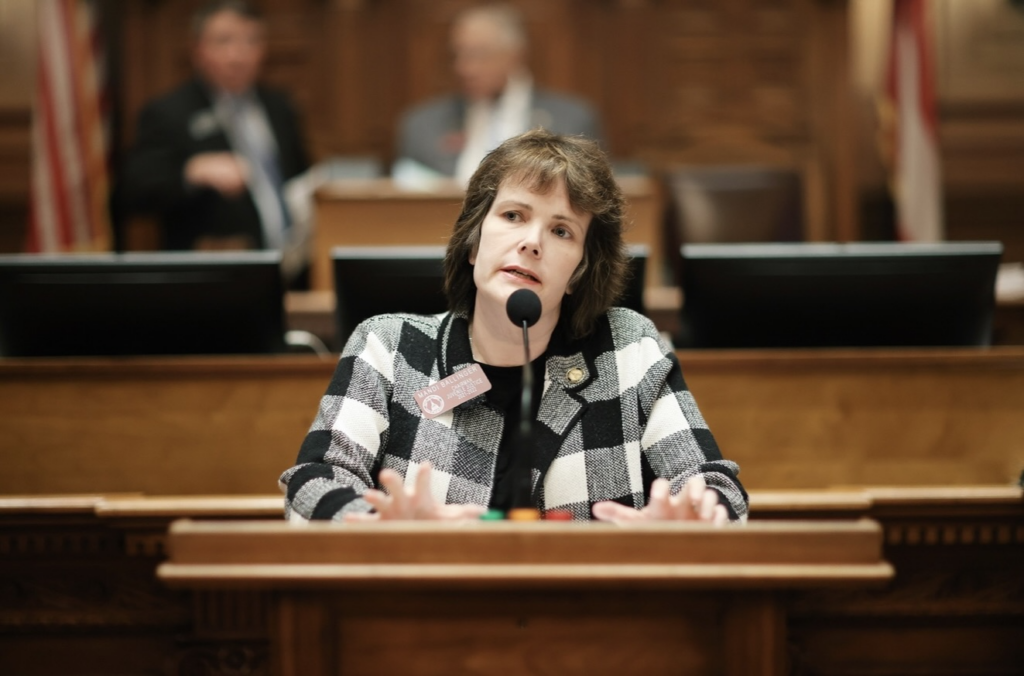
While she says her team is prioritizing review of higher-risk offenders, they often don’t get enough information on some cases to do that in a timely way, particularly on offenders who move to Georgia after being convicted in other states. Some states, including Florida, she said, are slow or even refuse to provide detailed case information. Offenders with out-of-state convictions now make up about half of SORRB’s current case backlog.
In all, courts and law enforcement agencies refer about 150 cases per month to SORRB, but its 12-member volunteer board — composed of law enforcement officers, clinical counselors with sex offender expertise, lawmakers and a victims’ rights advocate — can only review and classify about 50 to 60 cases at each monthly meeting.
Alvord said the bill she and Ballinger are fine-tuning will call for the SORRB board “to focus on policy-making and assisting legislators and others to understand our work, and allow the case evaluators to do the sex offender evaluations and risk leveling, because they are really the experts at this.
“I mean, 99.9% of the time, they [board members] agree with the evaluators’ recommendation,” said Alvord. “And they spend a lot of time reading about cases when they could be using their expertise in a more advantageous way.”
To make this organizational change work, Alvord said her staff will need to expand to include more investigators, clinical evaluators and administrative staff. She has requested another $490,000 from the state to fund nine new positions for the fiscal year 2024. Currently, the total agency budget is $935,000, not counting $235,000 in federal funds for investigators that SORRB has been receiving since 2017 to help reduce the case backlog.
Ballinger’s bill will also recommend that SORBB expand its three-tiered system of risk levels for sexual offenders to five tiers, which Alvord said “will help better distinguish who is at the least possible risk and the most possible risk.”
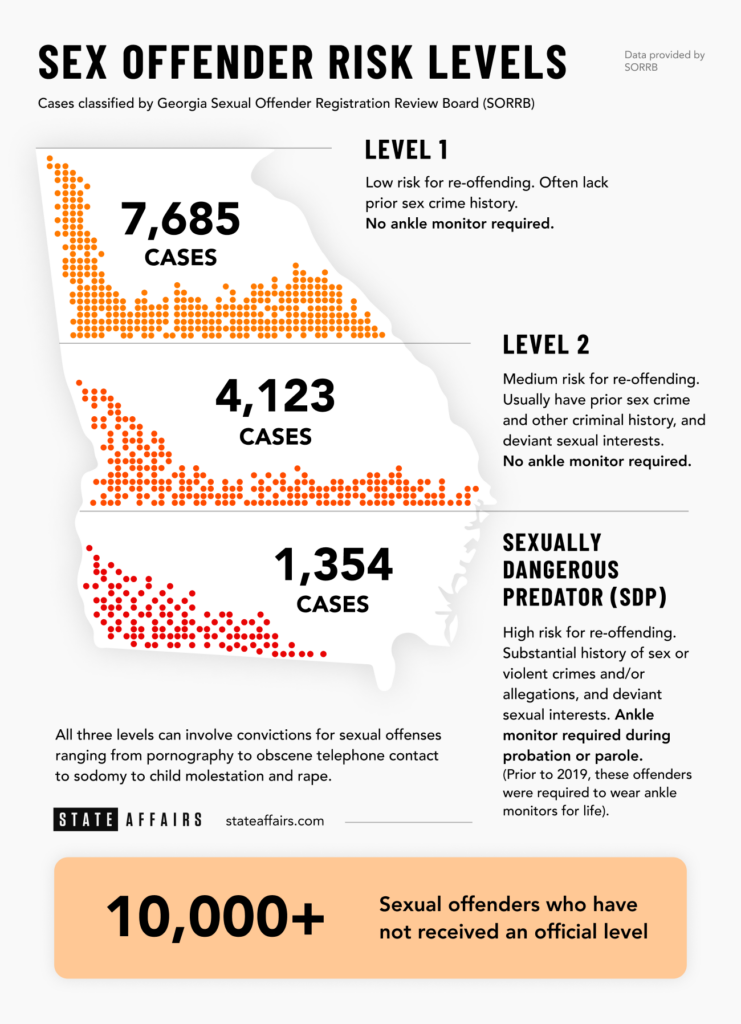
Having five tiers of risk, she said, “would allow not just SORRB but all of the agencies responsible for monitoring or determining what’s going to happen to sex offenders to make better decisions.”
Marina Peed, executive director of Mosaic Georgia, a sexual assault and children’s advocacy center, said the proposed restructuring of SORRB makes sense.
“I can see how the additional risk levels would help better define the behavior patterns of people who willingly sexually violate other people, and also to show if some people are trying to change and making any progress,” said Peed. “But I am frankly most concerned about the capacity of SORRB to have enough staffing resources to be able to do adequate risk assessments of every sex offender that gets referred to them. Their backlog is a real problem in terms of public safety.
“The state says it wants our communities to be as safe as possible, but part of being tough on gangs and crimes is making sure that the agencies responsible for helping make that happen have the resources to do their jobs effectively,” she added. “SORRB is only one of the government agencies that are having to triage the worst of the worst cases that come before them because they don’t have enough staffing or funding. It would be really great to see that acknowledged in the state budget.”
Outside a barbecue restaurant in the Summerhill neighborhood of Fulton County, where 44 people classified as sexually dangerous predators have been released from ankle monitors in the last few years, two neighborhood friends debated the merits and drawbacks of the proposed legislation that would change how sexual offenders are treated.
“Lifetime ankle monitors sounds pretty drastic,” said Marc Ebelhar, 41. “The idea that there’s no opportunity for that person to change, and to be completely monitored at all times, seems a little Big Brother to me.”
“I appreciate that concern you have,” said Quinton Myers, 39. “But then again, think about the victims — they have a life sentence of mental and emotional abuse from being offended in a sexual manner. I have a daughter and like, God forbid anything would happen like that to her and this person goes and does it again? I can see where that law would apply. I can see that you’d want to give grace, but man, it’s such an egregious offense.”
Have thoughts or tips on how sexual offenders are handled in Georgia? Contact Jill Jordan Sieder on Twitter @JOURNALISTAJILL or at [email protected].
Twitter @STATEAFFAIRSGA
Instagram @STATEAFFAIRSGA
Facebook @STATEAFFAIRSUS
LinkedIn @STATEAFFAIRS
Read more on our ongoing coverage of this topic:
Georgia Sex Predator Ankle Monitor Removals Near 670 as Legislation Stalls
Ankle Monitors Gone for Hundreds of Sex Predators in Georgia
Professionals still face licensing delays amid state’s transition to online system
The Gist Georgia’s professionals and business owners are still struggling to obtain professional licenses in a timely manner. As the Secretary of State’s Office rolls out its new Georgia Online Application Licensing System to expedite the process, the efficiency of this new process is being put to the test. What’s Happening Thursday morning at the …
Controversy over AP African American Studies class grows
Rashad Brown has been teaching Advanced Placement African American Studies at Atlanta’s Maynard Jackson High School for three years. He’ll continue to do so — even though the state’s top education official removed it from the list of state-funded course offerings for the upcoming school year. While Brown prepares to start teaching his class on …
Students, teachers, lawmakers blast decision to end AP African American history classes
ATLANTA — A coalition of lawmakers, civil rights leaders, clergy, educators and students Wednesday called on the state’s education czar to rescind his decision to drop an advanced placement African American studies class from the state’s curriculum for the upcoming school year. “This decision is the latest attack in a long-running GOP assault on Georgia’s …
Kamala Harris’ presidential bid reinvigorates Georgia Democrats
Georgia Democrats have gained new momentum heading into the November election, propelled by President Joe Biden’s decision to bow out of his reelection bid and hand the reins to Vice President Kamala Harris. The historic decision, announced Sunday, is expected to prove pivotal in the national and state political arenas and breathe new life and …




